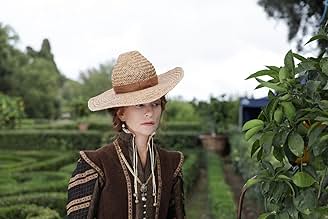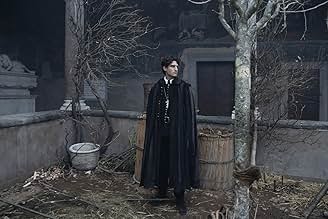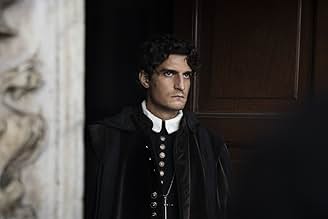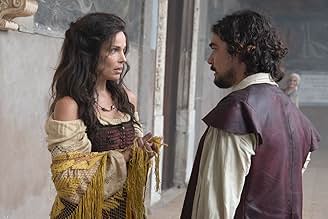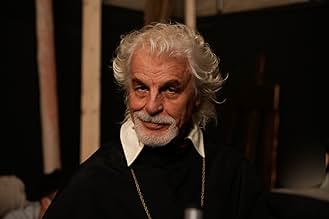VALUTAZIONE IMDb
6,5/10
1902
LA TUA VALUTAZIONE
La Chiesa cattolica indaga segretamente su Caravaggio mentre il papa valuta se concedergli la clemenza per aver ucciso un rivale.La Chiesa cattolica indaga segretamente su Caravaggio mentre il papa valuta se concedergli la clemenza per aver ucciso un rivale.La Chiesa cattolica indaga segretamente su Caravaggio mentre il papa valuta se concedergli la clemenza per aver ucciso un rivale.
- Regia
- Sceneggiatura
- Star
- Premi
- 13 vittorie e 6 candidature totali
Recensioni in evidenza
Carravaggio
For fully appreciate this movie, it help to be a fan of the work of the painter ...as one understand more what was the motivation behind his choices , and why his works were so controversial yet so good...the Catholic Church at the time was the Church, the only one yet the rise of what would become the Protestant churches were making the Vatican nervous.
The conflict between the reality of life of the average people and the grandiose representation of the saints ...had no much income ...
Knowledge of some of the work of Caravaggio help understanding lots of scenes in this movie ...and what makes his work so good is what was no conceivable at the time...that you could use the face of common daily people to personified a saint , an angel ..which of my God of the time had no gender, no sex...
For fully appreciate this movie, it help to be a fan of the work of the painter ...as one understand more what was the motivation behind his choices , and why his works were so controversial yet so good...the Catholic Church at the time was the Church, the only one yet the rise of what would become the Protestant churches were making the Vatican nervous.
The conflict between the reality of life of the average people and the grandiose representation of the saints ...had no much income ...
Knowledge of some of the work of Caravaggio help understanding lots of scenes in this movie ...and what makes his work so good is what was no conceivable at the time...that you could use the face of common daily people to personified a saint , an angel ..which of my God of the time had no gender, no sex...
L'Ombra di Caravaggio promises a fiery portrait of a tortured genius and instead delivers two hours of overwrought mood lighting, erratic time jumps, and enough theatrical whispering to power an entire semester at drama school.
The film adopts the now-inescapable "non-linear" structure, which in this case means the plot zigzags like a drunk fencing master. Sure they toss in a few time markers, but stylistically it's all one long, indistinguishable swirl of tormented men in cloaks.
Our anti-hero Caravaggio is painted (pardon the pun) as your typical Renaissance bad boy: rebellious, tortured, bisexual, brooding, but also - plot twist! - a devout Catholic. Because nothing screams "believable complexity" like orgies one minute and confessions the next. He's supposed to feel radical, but ends up as a kind of art-school Jesus with eyeliner.
Enter "Ombra," the Church's enforcer and a villain so laughably named it's amazing no one bursts out laughing when he introduces himself. Shadow, really? Why not just call him "Father Oppression" and be done with it? He spends most of the film lurking in corners and embodying the Vatican's greatest hits: repression, judgment, and fabulous robes.
As far as the orgies are concerned, we didn't need quite so many scenes of candlelit debauchery, complete with bored courtesans, snarling pigs, and pouting boys.
To pad things out between the sex and the brooding, the film indulges in lavish re-creations of Caravaggio's paintings, which are admittedly striking - if you enjoy watching actors pose like a diorama in a museum gift shop. At times, it feels less like a biopic and more like an over-budgeted PowerPoint presentation on Baroque composition.
And then there's the ending. Since history has left Caravaggio's death ambiguous, the filmmakers go full fan-fiction and cook up a finale that manages to be both absurd and deeply unsatisfying. One almost expects him to ascend into a ray of divine light, paintbrush in hand.
On the plus side the lighting is gorgeous. Every scene looks like it's been lit by angels and Instagram filters. But beautiful visuals can only carry you so far when the script feels like a Gregorian soap opera.
The film adopts the now-inescapable "non-linear" structure, which in this case means the plot zigzags like a drunk fencing master. Sure they toss in a few time markers, but stylistically it's all one long, indistinguishable swirl of tormented men in cloaks.
Our anti-hero Caravaggio is painted (pardon the pun) as your typical Renaissance bad boy: rebellious, tortured, bisexual, brooding, but also - plot twist! - a devout Catholic. Because nothing screams "believable complexity" like orgies one minute and confessions the next. He's supposed to feel radical, but ends up as a kind of art-school Jesus with eyeliner.
Enter "Ombra," the Church's enforcer and a villain so laughably named it's amazing no one bursts out laughing when he introduces himself. Shadow, really? Why not just call him "Father Oppression" and be done with it? He spends most of the film lurking in corners and embodying the Vatican's greatest hits: repression, judgment, and fabulous robes.
As far as the orgies are concerned, we didn't need quite so many scenes of candlelit debauchery, complete with bored courtesans, snarling pigs, and pouting boys.
To pad things out between the sex and the brooding, the film indulges in lavish re-creations of Caravaggio's paintings, which are admittedly striking - if you enjoy watching actors pose like a diorama in a museum gift shop. At times, it feels less like a biopic and more like an over-budgeted PowerPoint presentation on Baroque composition.
And then there's the ending. Since history has left Caravaggio's death ambiguous, the filmmakers go full fan-fiction and cook up a finale that manages to be both absurd and deeply unsatisfying. One almost expects him to ascend into a ray of divine light, paintbrush in hand.
On the plus side the lighting is gorgeous. Every scene looks like it's been lit by angels and Instagram filters. But beautiful visuals can only carry you so far when the script feels like a Gregorian soap opera.
A lot is not known about Caravaggio's life, but a lot is. It is understandable and legitimate that a film like this fills in the unknown gaps. The fact that it twists, falsifies and rewrites the known things is unworthy of a biography.
I am anything but a friend of the Catholic Church and even less of the church leaders. But the way he was portrayed here in a one-sided way as a victim of the church, whose representatives were Caravaggio's most zealous supporters, is infamous. "The Death of Mary" has nothing to do with being rejected by a pope; the monks who commissioned it did that themselves. Because Caravaggio did not paint in accordance with the commission. And the painting was not saved by Rubens, who is said to have bought it in Rome according to the film, but by Ferdinando Gonzaga, Duke of Mantua, the year after it was completed. Or the questioning of Artemisia Gentileschi. Caravaggio probably didn't even know her, even if her father did.
And these inaccuracies, distortions and falsifications run through the entire film, which has only one goal: to save the artist's honor. But he doesn't need to be saved. His art speaks for itself, as does his raw, unbridled character, which borders on brutality. Presenting the church as his murderer is an affront to all the church's real victims.
So an honorable attempt becomes a historically useless piece of work that doesn't bring you any closer to the artist's work. His apotheotic classification as a three-eyed man among the blind is tiring early on in the film.
I am anything but a friend of the Catholic Church and even less of the church leaders. But the way he was portrayed here in a one-sided way as a victim of the church, whose representatives were Caravaggio's most zealous supporters, is infamous. "The Death of Mary" has nothing to do with being rejected by a pope; the monks who commissioned it did that themselves. Because Caravaggio did not paint in accordance with the commission. And the painting was not saved by Rubens, who is said to have bought it in Rome according to the film, but by Ferdinando Gonzaga, Duke of Mantua, the year after it was completed. Or the questioning of Artemisia Gentileschi. Caravaggio probably didn't even know her, even if her father did.
And these inaccuracies, distortions and falsifications run through the entire film, which has only one goal: to save the artist's honor. But he doesn't need to be saved. His art speaks for itself, as does his raw, unbridled character, which borders on brutality. Presenting the church as his murderer is an affront to all the church's real victims.
So an honorable attempt becomes a historically useless piece of work that doesn't bring you any closer to the artist's work. His apotheotic classification as a three-eyed man among the blind is tiring early on in the film.
I have watched the movie at the cinema, in Timisoara. The movie looks to carefully illustrate the life of the painter. The actors and the actresses are very nice interpretating their roles. The scenes, the costumes, the colours and the decorations are very loyal to the XVII secol, when Caravaggio lived. The main actor, playing as Caravaggio, is a great actor, full of passion.
It is interesting, and still present on our days) the conflict in understanding what is the good and what is bad, because the bad can be find in good and viceversa. And of course, this is an unique truth for each of us.
Even the movie is 2 hours long, I have not figured out when the time passed.
Congratulations to all actors and for the entire team of the movie!
It is interesting, and still present on our days) the conflict in understanding what is the good and what is bad, because the bad can be find in good and viceversa. And of course, this is an unique truth for each of us.
Even the movie is 2 hours long, I have not figured out when the time passed.
Congratulations to all actors and for the entire team of the movie!
The movie is the story of Michelangelo Merisi da Caravaggio who was an Italian painter in the 16th century, through the eyes of the Pope's investigator. He was known for painting "what he saw", some kind of reality that he wanted close to the divine, which was of course not ok with the Catholic Church. Within his paintings, you could see famous prostitutes, hoboes, represented as saints, such as Mary or St Peter. His life has multiple legends around it, he was known to have sexual relationships with both males and females, while painting for the Church, and his competitors tried to destroy him for that. He had to flee Rome after killing (accidentally?) someone and lived in Naples, Sicily, Malta, etc. The story of the movie is a bit long, but this is not why you should see this movie. The whole movie is staged as a painting, with that kind of atmosphere that you get from 16th century Italian paintings. Would I watch it again? No, but I am happy I watched it.
Lo sapevi?
- QuizRiccardo Scamarcio said about Caravaggio's character: "I immediately thought that [Caravaggio] was like Elvis Presley. My reference was Elvis. A small-town boy with great energy, passion, talent and rigor towards art. At that time, painting was the mainstream, there was nothing else, there was no photography, there was no radio, television or cinema. Paintings were so powerful because they spoke directly to the unconscious. And this man was the first to represent sacred images in a completely different way."
- BlooperTutte le opzioni contengono spoiler
I più visti
Accedi per valutare e creare un elenco di titoli salvati per ottenere consigli personalizzati
- How long is Caravaggio's Shadow?Powered by Alexa
Dettagli
Botteghino
- Budget
- 12.261.966 € (previsto)
- Lordo in tutto il mondo
- 4.895.695 USD
- Tempo di esecuzione2 ore
- Colore
- Proporzioni
- 2.39 : 1
Contribuisci a questa pagina
Suggerisci una modifica o aggiungi i contenuti mancanti

Divario superiore
By what name was L'ombra di Caravaggio (2022) officially released in India in English?
Rispondi
